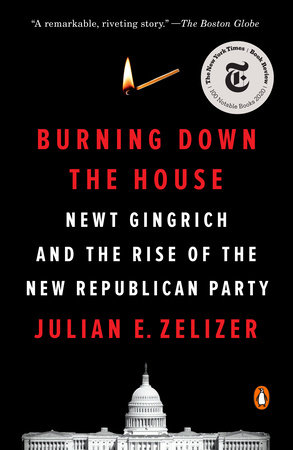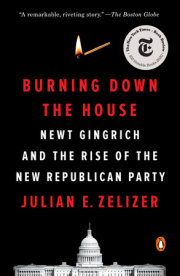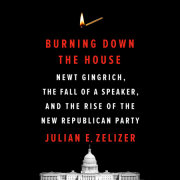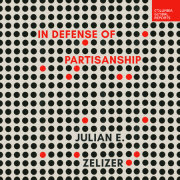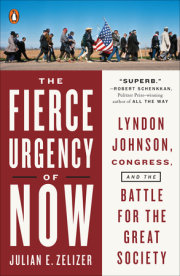One
The Making of a Renegade Republican
When Newt Gingrich arrived on Capitol Hill in January 1979 to begin his first term as a U.S. representative from Georgia, he still saw himself as an outsider. The supremely confident Gingrich, who liked to describe himself as a "Pennsylvania-born army brat," had a love-hate relationship with authority figures. Whether it was dating an older woman-his high school teacher-despite his stepfather's admonition against doing so or applying to be the president of a college just a few months after joining as a junior faculty member, Gingrich had never been deferential to any of the bosses in his life. His favorite film in the late 1970s was Animal House, a raucous comedy about a fraternity of misfits who made life impossible for the dean.
Although he didn't like the people in charge, he thirsted for the power that they unjustly held. As a teenager, Gingrich explained to a teacher that he planned to move to Georgia when he was older to create a Republican Party. It didn't concern him that some Republicans already lived in the Peach State; he would do it better. On this and most issues, Gingrich tended to believe in the essential rightness of his views and was often unable to even hear what his opponents were saying. Extraordinarily arrogant, totally self-absorbed, and brutally ruthless, he rarely allowed anything or anyone to stand in his way. He arrived in Washington at the end of his fellow Georgian Jimmy Carter's troubled presidency determined to tear everything down.
A tough upbringing shaped Gingrich's demeanor. He grew up in a home that lacked much compassion. His parents, Kathleen ÒKitÓ Daugherty and ÒBigÓ Newton McPherson Jr., separated just months after he was born on June 17, 1943, in Harrisburg, the capital of Pennsylvania. The couple had met at a roller-skating rink, a working-class hangout where teenagers congregated to flirt and mingle. Kit instantly found herself attracted to the charismatic Newton. But the initial excitement wore off as she discovered that the hulking, six-foot-three Newton was an alcoholic with a penchant for loitering at bars, playing pool, and gambling. In short order, his drinking habits deteriorated. Bar fights were a regular occurrence. He became physically intimidating and even abusive to her during his binges.
Still, Kit said yes when he proposed, hoping that marriage would mature him and make him take more responsibility for his behavior. It proved difficult for her to live with that rationalization for long. Before the wedding, Kit (only sixteen years old) got cold feet as his long nights at the bars increased. Kit told her mother that she didn't want to marry Newton. But her mother, a widow who had enjoyed a wonderful marriage, pressured her into going through with the wedding, reminding her daughter that the announcement was all set to run in the local newspaper, so it would be embarrassing to the family if she pulled out at the last minute.
The union only lasted three days. Kit walked out on her husband after he assaulted her for waking him up from a drunken stupor. Rather than reform his ways, Newton decided to join the navy during World War II. Within a few weeks, Kit learned that she was pregnant. Their son, whom she named Newton Leroy (Newt for short), was born in June. Her husband returned from the war on a temporary leave in August only to formally begin the divorce process. Kit moved back in with her mother to save money.
With no father at home and with his mother working at a local factory on wartime production, Newt depended on his extended family for nurturing during the war years. His grandmother, aunts, and uncles-all of whom lived in the working-class, Republican town of Hummelstown, just east of Harrisburg and on the way to Hershey-tried to offer Newt the parental support that he otherwise lacked. The small, picturesque community, founded before the American Revolution, was largely populated by government workers who commuted to Harrisburg and employees of the Hershey chocolate plant. From a young age, Newt was encouraged by his family to find solace in reading and study; his grandmother, a teacher, instilled a strong commitment to education in her children and grandchildren, even though many of their family members were blue-collar workers who had not attended college.
Three years after her divorce, Kit Daugherty married an army lieutenant colonel named Robert "Gus" Gingrich, who was studying biology at Gettysburg College. He was on temporary leave from the military while recovering from a hernia. Robert was willing to raise Newt as his own but offered his young stepson scant warmth.
Robert, who liked to wear his lieutenant colonel uniform to his high school reunions in Hummelstown, also had a hardscrabble beginning. He was abandoned by his unwed teenage mother and grew up as a foster child until a family adopted him at age sixteen. Robert concluded that children needed to become self-sufficient and steely. He thought that Newt's grandmother had been too doting and that the boy needed to toughen up. Newt and his sisters-Susan, born in 1948, and Roberta, born in 1951-feared their father's temper and intolerance of anyone who broke the rules. Newt grew up thinking that Robert was his biological father, but hugs, fishing, playing catch, and other gestures of paternal affection were few. "He can go a whole day and say only fifty words," Gingrich's mother said. Newt usually felt alone in his home, finding comfort in his extensive collection of snakes and books about zoology.
The end of World War II didn't make things much easier for the Gingrich family. They were not among the millions of veteran families that found prosperous lives in the growing suburbs of 1950s America. Between the ages of three and eleven, Gingrich lived in a modest apartment in Hummelstown, on top of a fumy gas station. He shared a room with his grandmother, who kept one eye open for much of the night because she was terrified of his many jars of snakes. (He named one of the reptiles "Oscar Aloysius Stinky III.")
The dinner table was always lively at the Gingrich home, albeit with clear rules. Newt's father would go around the table to grill each child about what they had learned in school that day. None of the kids dared challenge their father. "Dad was the ruler of the house," Gingrich's sister Susan recalled.
Once the Korean War started, Robert was again called on to serve. Kit found herself working hard to raise the kids even as she continued to struggle with depression. The kids spent as much time taking care of her as she did them.
Newt and his sisters learned to fend for themselves. "I was a 50-year-old at 9," Gingrich recalled. At age eleven, telling his mom that he was going to the library, Newt bought a bus ticket to Harrisburg to see two documentaries about African wildlife. He was enchanted by the films and left the theater wondering why Harrisburg didn't have its own zoo. As he walked onto the street, Newt noticed a sign pointing to city hall. Instead of heading back toward the bus, an inspired Gingrich walked directly over to the government building. The receptionist, amused to hear a young boy so earnestly asking her about why the city didn't have a zoo, sent him upstairs to meet with the assistant director of parks and recreation. The two had a serious conversation, reviewing old files, budgets, and well-worn maps. The civil servant explained to Gingrich that if he wanted to pursue the idea further, he needed to return the following week to make his case directly to the city council. He ordered a cab to drive Gingrich home, handing him a thick book of laws and regulations as a souvenir for his efforts. Gingrich returned dutifully the next Tuesday and waited his turn to address the council. The zoo did not get built, but Paul Walker, the editor of a city newspaper, the Harrisburg Home Star, was so captivated by watching this neatly dressed, polite young boy make his case to a roomful of government officials (which was much more interesting to him than the other matters on the agenda, namely garbage collection) that he published a story about the curious incident. "An 11-year-old is fighting in City Hall here in an attempt to establish a zoo in the city's Wildwood Park," Walker wrote, in an article titled ambitious zoo keeper which was picked up by the Associated Press. "Young Newton Gingrich told Mayor Claude Robins and four city Councilmen that he and a number of youthful buddies could round up enough animals to get the project started if granted use of the park." Walker also allowed Gingrich to write an article that appeared on the front page of the local giveaway paper, about why Harrisburg needed a zoo.
Not everything about Gingrich was serious. He loved to memorize comedy routines from television stars such as Red Skelton and Dick Van Dyke. He also had a mischievous side. His favorite prank was to pretend that his friend Dennis Yantz had beaten him up on the sidewalk. When someone pulled over to see if he was okay, Gingrich would push Yantz aside, jump up, and yell, "Surprise!" He would laugh in delight as he watched the startled stranger jump back. One of Newt's go-to places in Harrisburg was the movie theater, where he especially enjoyed classic Westerns and war films on the big screen. Newt loved to watch his movie heroes, including John Wayne, track down and kill the bad guys, no matter how powerful they were.
Newt had an insatiable appetite for learning and new ideas. Following his father's service in the Korean War, the family moved to Fort Riley in Kansas. Newt instantly stood out in the classroom. He expanded his early interest in zoology, obsessively studying different species and endlessly talking about them with his teachers and classmates. "Newtie," as his mother called him, fed his snakes hard-boiled eggs as she looked on apprehensively. At Fort Riley, he had the opportunity to spend time with Lucius Clay, the famed U.S. colonel who had administered occupied Germany after World War II, who now schooled the precocious boy in international relations and the art of war. According to one biographer, Newt could stand in a roomful of parents and feel totally at ease, without the nerdy awkwardness he displayed around other kids.
In 1956, when Newt was thirteen, the family moved again, when the military stationed Robert Gingrich in France. The entire family packed up and moved with him. His father purchased an expensive set of the Encyclopedia Britannica, which Newt treasured, devouring every entry. But his relationship with his father remained icy. When the fifteen-year-old Newt and a friend stayed out late one night, breaking his father's 11:00 p.m. curfew rule, Robert snatched his son up by the shirt and pinned him to the wall. After a few seconds, the father let go, dropping the teen to the ground; without looking back, he walked away, confident that his son would never repeat the mistake again.
Such tense moments were not all that young Newt experienced with his dad. On a weekend trip, he was deeply moved by the World War I battlefield at Verdun, where the barbed wire and trenches were still visible; the young American picked up helmets buried in the dirt and saw the bones of 100,000 deceased servicemen stacked behind a glass window. The visit brought home to Gingrich the grim reality of the devastation inflicted by war, as well as the ongoing threats that democracy still faced. This was the height of the cold war, and Newt interpreted issues through a moralist lens, viewing politics as an epic struggle between good and evil. Over the course of an entire school year, he wrote a two-hundred-page, single-spaced paper about the balance of global naval power. During the family's more than three years overseas-they spent the last leg of the tour in Stuttgart, Germany-he devoured various armed forces publications and listened to armed forces radio shows. While he admired his stepfather's continued service, Newt concluded that being a politician "was the most effective thing I could do to ensure that the US would remain free."
The Gingrich family returned to the United States in 1960. Robert was stationed at Fort Benning in Columbus, Georgia, where Newt entered the racially segregated Baker High School as a junior. Gingrich thrived in the classroom and excelled at debating. His high school classmates voted him "Most Intellectual." The only student carrying around an overflowing briefcase and wearing a pocket protector, Newt was hard to miss. While other teens were eagerly learning to drive, his mother recalled, he preferred to sit in the passenger seat and read.
At seventeen, Newt returned to Hummelstown, where he spent the summer of 1960 with his extended family. He sought out Paul Walker, the journalist who had written about his impromptu effort at lobbying as a child. Walker agreed to mentor him, even helping him to find work on some radio and television shows that a friend hosted. Gingrich spent most of his time calling to ask local businesses to purchase ads, the paper's main source of revenue. Walker, a loyal Democrat, introduced Newt to local politicians and lobbyists during their lunches at Davenport's Restaurant, where Gingrich was invited to listen in on the city's power brokers. Although his father and Walker were both Democrats, Newt was drawn to the small-government philosophy of the GOP.
Gingrich started to gain a feel for political organization as well as communication. Harrisburg was filled with churches and military installations, a city inhabited by working- and middle-class Republicans who were a central target of national party leaders seeking to broaden their electoral reach. When Gingrich learned that the city planned to temporarily shut down the State Museum for major renovations, he was upset; it was one of his favorite places to spend time. He exhibited his instinctive political skills by sharing the information with Walker, who in turn leaked the news to local reporters. Thanks to the ensuing backlash, the state kept the museum open during the work.
Back in Georgia that fall, inspired by his work in Harrisburg, Gingrich volunteered for Richard Nixon's 1960 presidential campaign, sending out mailers, making phone calls, knocking on doors, and organizing school debates to build interest in Nixon's candidacy. He and his coterie of high school friends-and there were not many southern Republicans in those days-were profoundly disappointed when Nixon lost narrowly to Senator John F. Kennedy. They spent all night drowning their sorrows in intense political conversation. One book that made a big impression during these years was Theodore White's Making of the President, 1960. Gingrich was fascinated with this gripping account of the 1960 presidential election, particularly White's discussion of an idea-oriented wing of the Republican Party that dated back to the nineteenth century. White argued that the GOP had become alienated from the "intellectual mainstream" since the end of Theodore Roosevelt's presidency when the "regulars" took control of the party machinery. The GOP paid a long-term price for the decision, White argued in a point that captured Gingrich's attention, including in 1960 with Richard Nixon, who had not offered voters any vision.
Copyright © 2020 by Julian E. Zelizer. All rights reserved. No part of this excerpt may be reproduced or reprinted without permission in writing from the publisher.

